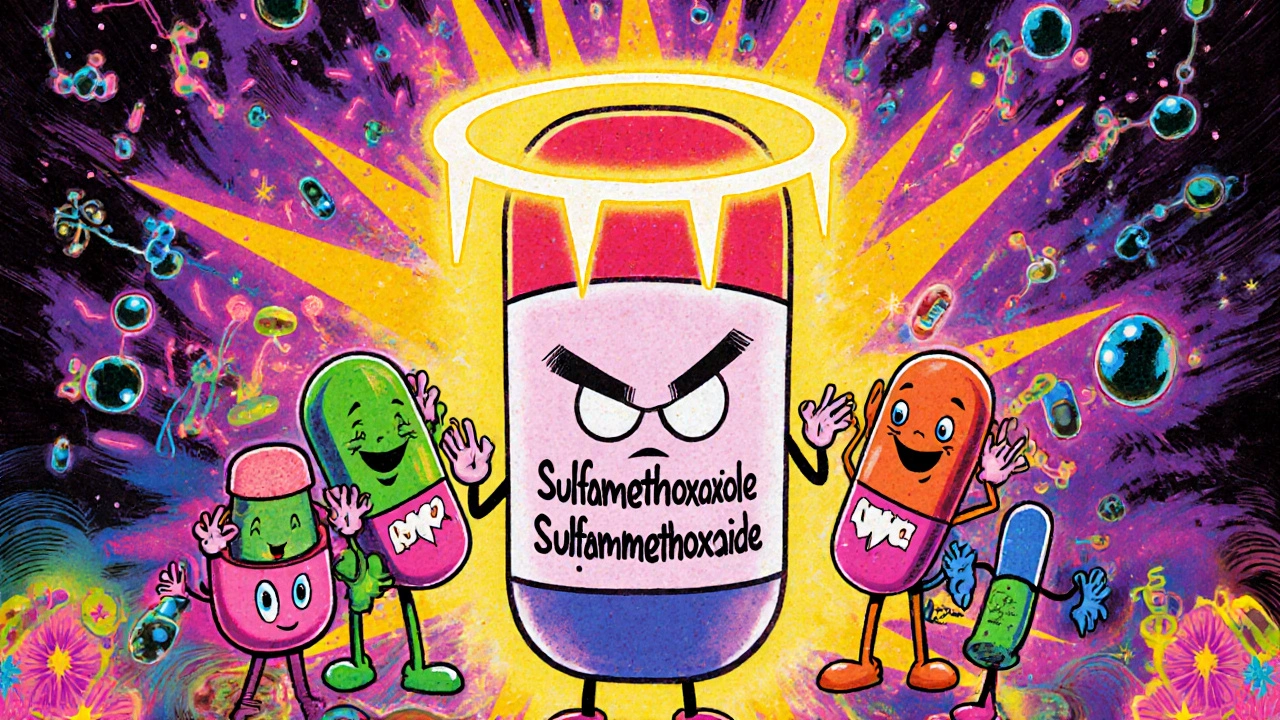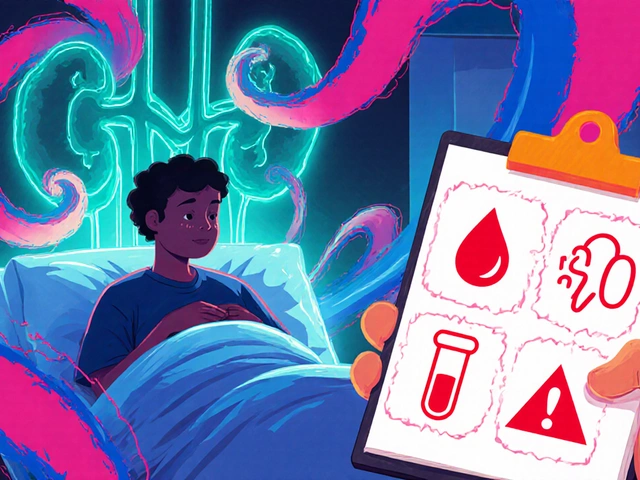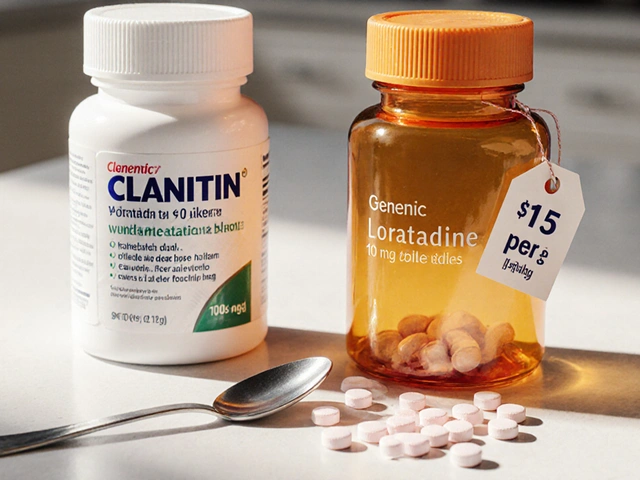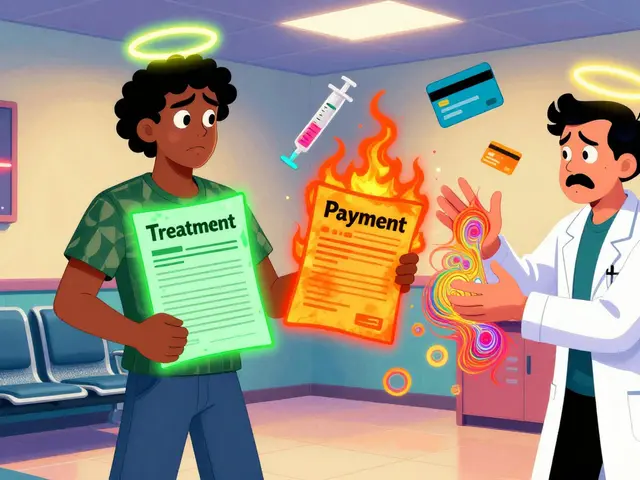Most people who say they have a "sulfa allergy" don’t actually need to avoid all medications with sulfur in them. In fact, the term is often misunderstood - and that misunderstanding can put your health at risk. You might be avoiding blood pressure pills, diuretics, or even pain relievers you could safely take, simply because someone told you once that you were allergic to "sulfa." But here’s the truth: sulfonamide antibiotics are not the same as other drugs that contain a sulfonamide group. And the difference matters more than you think.
What Is a Sulfonamide Allergy, Really?
When someone says they have a "sulfa allergy," they’re usually talking about a reaction to an sulfonamide antibiotic - like sulfamethoxazole (often combined with trimethoprim as Bactrim or Septra) or sulfadiazine. These drugs were among the first antibiotics ever developed, introduced in the 1930s. Back then, reactions were more common because dosing wasn’t as precise, and people weren’t monitored closely. Today, we know that true allergic reactions to these antibiotics are rare. Only about 0.3% to 0.5% of the population has a real IgE-mediated allergy - the kind that causes hives, swelling, or anaphylaxis. Most people who report a "sulfa allergy" had a mild rash, maybe a fever, or stomach upset. These aren’t allergies. They’re side effects. But they still get labeled as "allergies" in medical records - and that label sticks. The problem? That label leads to worse outcomes. A 2021 study found that when someone has a documented "sulfa allergy," doctors avoid sulfonamide antibiotics 78% of the time. Instead, they prescribe broader-spectrum drugs like fluoroquinolones - which carry black box warnings for tendon rupture, nerve damage, and even aortic aneurysm. You’re trading a low-risk, well-understood drug for one that’s more dangerous, just because of a mislabel.The Big Myth: All Sulfonamides Are the Same
Here’s where things get confusing. Many drugs contain a "sulfonamide group" - that’s the SO2NH2 part of the molecule. But that’s like saying all red cars are the same because they’re red. The rest of the structure matters. Sulfonamide antibiotics have two key features: an arylamine group at the N4 position and a nitrogen-containing ring at the N1 position. These are what make them likely to trigger immune reactions. When your body breaks them down, they form reactive molecules that bind to proteins and confuse your immune system. Now look at nonantimicrobial sulfonamides - like hydrochlorothiazide (a blood pressure pill), furosemide (a water pill), celecoxib (Celebrex), and acetazolamide (for glaucoma or altitude sickness). These drugs lack the arylamine group. Their chemical structure is completely different. They don’t produce the same reactive metabolites. And because of that, your immune system doesn’t recognize them as threats. A 2022 review of over 10,000 patients found that those with a documented sulfonamide antibiotic allergy had only a 1.1% chance of reacting to a nonantimicrobial sulfonamide. That’s almost the same rate as people who never had a "sulfa allergy" at all. The odds? Not statistically different.What You Can Still Take - Safely
If you’ve been told you’re allergic to sulfa, here’s what you can likely take without risk:- Hydrochlorothiazide - for high blood pressure
- Furosemide - for fluid retention
- Celecoxib - for arthritis pain
- Acetazolamide - for glaucoma or mountain sickness
- Sumatriptan - for migraines
- Metformin - for diabetes (yes, it has a sulfonamide-like structure, but it’s not a sulfonamide drug)

What You Should Still Avoid - And Why
There is one major exception: dapsone. It’s used to treat leprosy, certain skin conditions, and to prevent pneumonia in people with weakened immune systems. Dapsone shares structural similarities with sulfonamide antibiotics - including the arylamine group. Studies show that people with a true sulfonamide antibiotic allergy have up to a 13% chance of reacting to dapsone. That’s not negligible. If you’ve had a severe reaction like Stevens-Johnson syndrome to a sulfonamide antibiotic, dapsone should be avoided unless under strict medical supervision. Also avoid other sulfonamide antibiotics if you’ve had a confirmed reaction:- Sulfamethoxazole (with trimethoprim)
- Sulfadiazine
- Sulfasalazine
- Sulfacetamide
- Sulfanilamide
What You Don’t Need to Avoid - Even Though You Think You Do
A lot of people think "sulfa allergy" means they can’t take anything with "sulfur," "sulfate," or "sulfite." That’s not true - and it’s dangerously wrong.- Sulfur is an element. It’s in your skin, hair, and nails. You can’t be allergic to sulfur.
- Sulfates (like magnesium sulfate or sodium lauryl sulfate) are salts. They’re in Epsom salts, shampoos, and IV fluids. No cross-reactivity.
- Sulfites are preservatives in wine, dried fruit, and some medications. They can trigger asthma in sensitive people - but that’s a completely different mechanism than a sulfonamide allergy.

How to Get Your Label Fixed
If you’ve been told you have a "sulfa allergy," but you’re not sure if it was real - or if it was just a mild rash - you can get it cleared. The process is simple, safe, and often done in an allergist’s office. If your reaction was mild: A rash that appeared more than 72 hours after taking the drug, without fever, blistering, or trouble breathing - you’re likely a candidate for an oral challenge. The allergist gives you a small dose of a nonantimicrobial sulfonamide (like hydrochlorothiazide) and watches you for a few hours. In studies, this works with a 99.2% safety rate. If your reaction was severe: Hives, swelling, trouble breathing, or skin peeling (like Stevens-Johnson) - you need skin testing and a graded challenge under supervision. Even then, most people pass. One 2022 study showed that 95% of patients with a "sulfa allergy" label tolerated a challenge. What to ask your doctor: "Can you check if my reaction was truly allergic? Can you refer me to an allergist to test it?" And if your record just says "allergic to sulfa," ask them to update it to say: "Mild rash on day 5 of sulfamethoxazole-trimethoprim - no known reaction to other sulfonamides."Why This Matters Beyond You
This isn’t just about your personal health. Mislabeling sulfonamide allergies contributes to antibiotic resistance. When doctors can’t use sulfamethoxazole-trimethoprim for a urinary tract infection, they reach for stronger drugs. That pushes bacteria to evolve. The CDC says this practice increases resistance in E. coli by over 8% and in Staphylococcus aureus by over 12%. It also costs money. In the U.S. alone, inappropriate avoidance of sulfonamide antibiotics adds $1.2 billion a year to healthcare costs - from longer hospital stays, more expensive drugs, and extra tests. And it’s getting better. Hospitals are starting to use electronic health record systems that flag when a "sulfa allergy" label is vague. They now prompt doctors to ask: "Was this a true allergy? What was the reaction?" Some systems even suggest alternatives based on the specific reaction type.Final Advice: Don’t Assume - Find Out
If you’ve been told you have a "sulfa allergy," don’t live with it as a life sentence. Ask for clarification. Ask for a referral. Ask for testing. You might be avoiding safe, effective, and cheaper medications for no reason. You might be taking riskier drugs that hurt you more. And you might be helping create superbugs. The science is clear: not all sulfonamides are the same. And your allergy label - if it’s outdated or vague - doesn’t have to define your treatment options anymore.Can I take hydrochlorothiazide if I have a sulfa allergy?
Yes, you can. Hydrochlorothiazide is a nonantimicrobial sulfonamide and does not share the chemical structure that causes allergic reactions to sulfonamide antibiotics like sulfamethoxazole. Multiple studies show no increased risk of reaction - the chance is about 1%, the same as people without any sulfa allergy label.
Is celecoxib safe if I’m allergic to sulfa antibiotics?
Yes. Celecoxib (Celebrex) contains a sulfonamide group but lacks the arylamine side chain that triggers immune reactions in sulfonamide antibiotics. Large studies involving over 10,000 patients show no significant cross-reactivity. It’s considered safe for most people with a history of sulfonamide antibiotic allergy.
Do sulfites and sulfates cause reactions in people with sulfa allergies?
No. Sulfites (used as preservatives) and sulfates (like magnesium sulfate) are chemically unrelated to sulfonamide antibiotics. A reaction to sulfites is a different mechanism - often asthma-related - and not connected to sulfa allergy. Many doctors mistakenly believe there’s a link, but research shows no connection.
What if I had a severe reaction like Stevens-Johnson syndrome?
If you had a life-threatening reaction like Stevens-Johnson syndrome or toxic epidermal necrolysis to a sulfonamide antibiotic, you should avoid all sulfonamide antibiotics again. However, nonantimicrobial sulfonamides like hydrochlorothiazide or celecoxib are still generally safe. Always consult an allergist before trying any new drug, even if the risk is low.
Can I be tested to confirm if I really have a sulfa allergy?
Yes. Allergists can perform skin tests and oral challenges with nonantimicrobial sulfonamides like hydrochlorothiazide or celecoxib. For high-risk patients, they may use a graded challenge with the original antibiotic under supervision. Studies show over 90% of people with a "sulfa allergy" label can safely tolerate these drugs after testing.
Why do doctors still avoid prescribing sulfonamides if the allergy is often mislabeled?
Many doctors aren’t trained on the latest research. Medical records often list "sulfa allergy" without details, so it’s easier to avoid the drug than to investigate. But guidelines from the American Academy of Allergy, Asthma & Immunology now strongly recommend re-evaluating these labels. Electronic health records are starting to help by prompting doctors to clarify the reaction type.







j jon
October 29, 2025 AT 06:36I had a rash on Bactrim back in college and spent 10 years avoiding every drug with "sulfa" in the name. Turned out it was just a mild side effect. Got tested last year with hydrochlorothiazide and now I’m on blood pressure meds that actually work. Why did no one tell me this sooner?
Kathryn Conant
October 29, 2025 AT 06:49This is the kind of medical myth that kills people quietly. You’re not allergic to sulfur-you’re allergic to a specific molecular structure that’s been mislabeled by lazy doctors and terrified patients. Stop letting fear dictate your treatment. Get tested. Take back your health.
Jules Tompkins
October 30, 2025 AT 22:34So let me get this straight-I’ve been avoiding celecoxib for 8 years because I got a rash from sulfamethoxazole in 2015? And now you’re telling me I could’ve been managing my arthritis without NSAID stomach chaos the whole time? My doctor didn’t even blink when I said "sulfa allergy." No wonder I feel like a guinea pig.
Rachel Marco-Havens
November 1, 2025 AT 05:03People who don’t understand immunology shouldn’t be making medical decisions for themselves or others. If you had a real IgE-mediated reaction, you’d know it. That rash you got? It was probably just a viral exanthem coinciding with antibiotics. Stop blaming your doctor for your ignorance. Get educated or shut up.
Sabrina Bergas
November 2, 2025 AT 20:19Let’s be real-this whole "sulfa allergy" thing is a product of pharmaceutical marketing and overcautious guidelines. The real issue? Doctors don’t want to be sued. So they avoid anything that *might* be risky-even if the risk is statistically zero. Meanwhile, patients get stuck on expensive, toxic alternatives. It’s not medicine. It’s liability management dressed in white coats.
Ramesh Deepan
November 4, 2025 AT 03:50As someone from India where antibiotics are often sold over the counter, I’ve seen this mess firsthand. People self-diagnose "sulfa allergy" after one stomach ache and then refuse all meds. We need community health workers to explain the difference-not just doctors. Education is the real prescription here.
Matt Renner
November 5, 2025 AT 11:05The data presented here is robust and aligns with current AAAAI guidelines. It is imperative that clinicians update their documentation practices to reflect the specificity of the reaction-e.g., "mild maculopapular rash to sulfamethoxazole-trimethoprim, no reaction to nonantimicrobial sulfonamides." This precision reduces unnecessary polypharmacy and improves patient outcomes.
Vishnupriya Srivastava
November 6, 2025 AT 02:29Statistical significance is meaningless when you’re the one breaking out in hives. Your 1.1% number doesn’t help the person who had Stevens-Johnson. You’re minimizing trauma in the name of epidemiology. Not everyone wants to be a statistic.
Melvin Thoede
November 7, 2025 AT 16:39Just got my allergy label updated after a 20-minute challenge with hydrochlorothiazide. No rash. No panic. Just relief. I’ve been taking furosemide for years without issue. Why did it take me 12 years to ask? Because no one ever told me it was okay to question the label. Thank you for this post. It’s life-changing.
Wayne Rendall
November 8, 2025 AT 00:15Brilliantly clear breakdown. I’m a GP and this is exactly the kind of nuanced information I wish was embedded in our EHR prompts. Too many systems still flag "sulfa allergy" as a blanket contraindication. Time to demand smarter clinical decision support. This isn’t just patient education-it’s system reform.